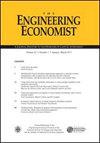Evaluating students with online testing modules in engineering economics: A comparision of student performance with online testing and with traditional assessments
IF 1.2
4区 经济学
Q4 BUSINESS
引用次数: 7
Abstract
Abstract Engineering economics courses often require students to take time-constrained, in-class exams in which they solve problems by hand, possibly referring to interest rate tables. Many students rely on partial credit to successfully pass exams. Outside of the classroom, professionals rely on computers to solve engineering economics problems, which raises the question of whether engineering economics courses are correctly assessing student performance. This article describes the study of a large engineering economics class using a non-conventional testing method. Student performance was evaluated using online testing modules with a stringent passing criterion, and the tests could be taken multiple times. The questions for each testing attempt were pulled from a database so that students received a new question every time. We compare the performance of students who were assessed using traditional methods with the performance of students assessed with these online testing modules. Our analysis shows that, overall, students who were assessed using the online testing modules earned better grades than students who were assessed via traditional methods. The analysis also discusses several benefits and drawbacks to using online assessments compared with traditional methods. The online assessment method could be useful in large engineering courses that are formula-based.用工程经济学在线测试模块评估学生:学生表现与在线测试和传统评估的比较
工程经济学课程通常要求学生参加有时间限制的课堂考试,在考试中他们要手抄问题,可能要参考利率表。许多学生依靠部分学分顺利通过考试。在课堂之外,专业人士依靠计算机来解决工程经济学问题,这就提出了一个问题,即工程经济学课程是否正确地评估了学生的表现。本文介绍了采用非常规测试方法对一个大型工程经济学班级进行的研究。学生的成绩通过在线测试模块进行评估,通过标准严格,测试可以多次进行。每次考试的问题都是从数据库中提取出来的,这样学生每次都会收到一个新问题。我们将使用传统方法评估的学生的表现与使用这些在线测试模块评估的学生的表现进行比较。我们的分析表明,总体而言,使用在线测试模块进行评估的学生比使用传统方法进行评估的学生取得了更好的成绩。分析还讨论了与传统方法相比,使用在线评估的几个优点和缺点。这种在线评估方法可以用于基于公式的大型工程课程。
本文章由计算机程序翻译,如有差异,请以英文原文为准。
求助全文
约1分钟内获得全文
求助全文
来源期刊

Engineering Economist
ENGINEERING, INDUSTRIAL-OPERATIONS RESEARCH & MANAGEMENT SCIENCE
CiteScore
2.00
自引率
0.00%
发文量
14
审稿时长
>12 weeks
期刊介绍:
The Engineering Economist is a refereed journal published jointly by the Engineering Economy Division of the American Society of Engineering Education (ASEE) and the Institute of Industrial and Systems Engineers (IISE). The journal publishes articles, case studies, surveys, and book and software reviews that represent original research, current practice, and teaching involving problems of capital investment.
The journal seeks submissions in a number of areas, including, but not limited to: capital investment analysis, financial risk management, cost estimation and accounting, cost of capital, design economics, economic decision analysis, engineering economy education, research and development, and the analysis of public policy when it is relevant to the economic investment decisions made by engineers and technology managers.
 求助内容:
求助内容: 应助结果提醒方式:
应助结果提醒方式:


